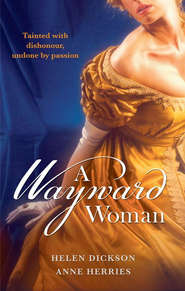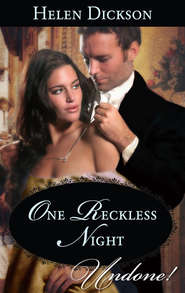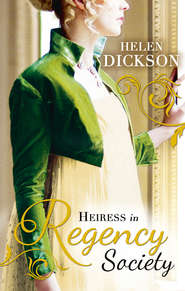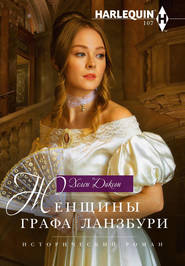По всем вопросам обращайтесь на: info@litportal.ru
(©) 2003-2024.
✖
Lord Lansbury's Christmas Wedding
Настройки чтения
Размер шрифта
Высота строк
Поля
Lord Lansbury watched Lydia go before turning to Jane. Her violet eyes with their long shadowing lashes were following Lydia. In one quick glance he saw the change her dress had made to her, the long creamy neck exposed. He saw the tiny dimple in her chin and the voluptuous curve of her red lips. He saw the tiny black mole high on her cheek where the rose faded into the gleaming white of her forehead. She was sensuous, provocative, glowing with colour like a country girl, and it seemed to him she was quite out of place among the elegant and sophisticated guests.
His granite features softened as if he understood how angry and humiliated she must be feeling by Lydia’s thoughtless remark. ‘I apologise for Lydia,’ he said. ‘She shouldn’t have said that about your father. I can see she has offended you with her frankness.’
At any other time she would have been absurdly flattered by his courtesy and concern, but now she was perplexed and shook her head. ‘Frank to the point of rudeness.’
‘I am sorry you see it that way. Lydia is American and tends to be outspoken.’ His voice was polite as he tried to smooth over the awkwardness of Miss Mortimer’s strained meeting with his future fiancée.
‘That does not excuse her. I am not used to Americans, but I am not prejudiced against the race. Miss Spelling should not have said what she did. I allow no one to speak ill of my father. He was a fine man. A clever man and a loving father. I could not have had better.’
Christopher’s entire face instantly became hard, shuttered and aloof. ‘You are fortunate in that, Miss Mortimer. More than you realise.’ With a slight inclination of his head, he said, ‘Excuse me.’
She stepped back. ‘Of course,’ she said stiffly, somewhat bewildered by the small knot of tension in the centre of her chest.
* * *
Jane knew a keen and surprising sense of disappointment when Lord Lansbury left her so abruptly. She watched him join the animated circle of guests that had collected round his mother. The hum of voices and laughter rose. Jane caught Lady Lansbury’s eye. The conversation between the three of them had been observed by Lady Lansbury, who was not too lost in her own that she was unable to monitor the situation a few yards away.
Jane let her eyes dwell on Lord Lansbury’s face. She had dressed with care, imagining the moment when she found herself in his company. She wanted to do something to make him look at her, and if not exactly see her, then at least realise she had the ability, the mind, perhaps, to capture his masculine attention. She so wanted to see that look in his eyes that he reserved for other females, the look that told them they were the most important person in the world to him at that moment.
Never had any man looked so attractive or so distant, and never had her heart called out so strongly to anyone. She knew she must fight her attraction for him. It would be madness to consider herself anything but out of his class, a social inferior. And his standards were not hers. She tried to pull her wits together, all too aware that the other women were studying her with furtive curiosity. She saw Lord Lansbury smile down into Miss Spelling’s upturned face. For one terrible moment she was seized with passionate hatred for the other woman, so terrible and so unexpected that she was shocked by it.
Normally Jane would feel no qualms about joining a group in conversation, but something about the way Lord Lansbury commanded the attention of those around him and the presence of Miss Spelling made her hold back.
She could not hear what he was saying, but she could tell that this was not just polite attention on the part of the listeners. Lord Lansbury held his audience in thrall. A moment later he laughed at a remark thrown his way, looked up and caught sight of Jane. He raised an eyebrow and then resumed his conversation.
‘Come, Christopher,’ Miss Spelling said, hooking her hand possessively through his arm. ‘I care little for standing still in the hot sun. Shall we circulate?’
The two moved off to exchange social niceties and introductions with the other guests, Miss Spelling sailing forth, very much aware of the stir she had created and obviously enjoying it as she and her handsome escort went from one group to the next.
As Jane watched them from across the stretch of lawn that lay like a rich green carpet between them, Lord Lansbury led Miss Spelling in the direction of a summer house, where several guests were seated, the servants dancing attendance on them. She suddenly realised that although he was perfectly attentive, there was no singular affection between them. There was a distance there and Miss Spelling seemed more interested in nodding and greeting those they encountered than engaging Lord Lansbury in conversation.
As if Lady Lansbury had read her thoughts, moving to stand beside her, she said, ‘So you have been introduced to Miss Spelling, Jane.’ She sighed deeply, shaking her head as her eyes followed her son and the woman who might be his intended as they conversed with the guests. ‘She is an American—which I suppose explains a great deal. And she is attractive, do you not agree, Jane?’
‘How could I not? She is very beautiful.’
‘Yes,’ Lady Lansbury said, somewhat absently on a wry note. ‘She has youth, beauty, excellent connections and wealth and a certain fashionable notoriety. What more could a man desire in a woman?’
Continuing to watch the pair, in answer to Lady Lansbury’s wistful comment Jane thought perhaps money was a useful commodity, and property. But then, as the only daughter of an American millionaire, Lydia Spelling had all that. But would she be as desirable if she wasn’t dressed by France’s finest couturiers and wallowing in luxury and wealth? Of course she was as attractive and amusing as any of her contemporaries, but, Jane wondered, was it her money that preceded her whenever she walked into a room? Was it her money that triggered all those sideways covert glances, the conversations that faltered when she approached?
‘Her father is very rich,’ Lady Lansbury went on, ‘made his money in industry—in railroads and armaments and commodities. But he is not a part of the social circle. Some would say Miss Spelling is a good catch, but rich American girls are not accepted by the New York Knickerbocker set.’
‘Then it could also be said that Miss Spelling has landed on her feet.’
‘Exactly. It appears that American girl’s outspokenness and independent spirits are characteristics that Englishmen find charming. On the whole that is the case. Lydia is Mr Spelling’s only child. He is ambitious. He wants only the very best for his daughter—a title, which is why he has brought her to Europe to display her like a costly gem to be admired. This gem is destined for a coronet, at least. Christopher can provide him with that. I can only hope my son knows what he’s doing.’
‘I’m sure he does, Lady Lansbury,’ Jane answered, careful to hide her envy of Lydia Spelling while wishing with every fibre of her being that she was the woman being flaunted on Lord Lansbury’s arm.
‘I’m not at all sure, Jane. I have great affection for my son, but he does have his faults. I’m concerned about him doing the right thing. But of course I take care not to let such comments reach his ears. It is his affair, after all, who he marries. But if I were a betting woman I’d wager he isn’t in love with her.’
‘Not everyone who marries is in love,’ Jane said quietly. ‘In some of the countries I have visited, men and women have their marriages arranged by their parents. Sometimes the couple don’t meet until their wedding day. I’ve heard the opinion that love and marriage are two separate things.’
Lady Lansbury studied her closely. ‘And what is your opinion, Jane?’
‘That those who expressed that opinion must be sadly cynical people. What other reason is there to marry?’
‘Children is a good place to start.’
Jane gave Lady Lansbury a look of feigned astonishment. ‘Oh! I did not realise one needed a wedding ceremony to beget children.’
Lady Lansbury laughed. ‘What a wicked observation, Jane. Some would say you are quite shocking.’
‘Wicked, maybe, but also sensible.’
Lady Lansbury’s smile died. ‘You are a wonderful revelation, Jane, and I shall enjoy continuing our conversation on marriage at another time.’ She glanced once more in the direction of her son, but then, recollecting herself, she looked directly at Jane. ‘Forgive me, my dear, for being so forthright, but—what I said about Christopher, I am sure I can rely on your discretion.’
As if reading her mind, Jane said, ‘Of course, Lady Lansbury. I never betray a confidence.’
A look of understanding passed between the two women. ‘Thank you, Jane,’ Lady Lansbury answered.
Considering Lord Lansbury’s affairs nothing to do with her, Jane thought it prudent to keep any further opinions on marriage to herself. For the time she had known Lady Lansbury, she had discovered she had a forthright friendliness she liked. They often talked together. Lady Lansbury was very frank. She told Jane how much she admired her Aunt Caroline, who had made quite a niche for herself since her husband’s death ten years ago.
Observing Octavia who was watching her brother, Jane noticed her cheeks were flushed and her eyes were larger and brighter than she had seen them. ‘Are you all right, Lady Octavia?’
She nodded. ‘Can we go and get something to eat? I’m hungry.’
‘Of course we can. If you will excuse us, Lady Lansbury.’
‘Of course, my dear. Run along,’ she said, looking with concern at her daughter as she fidgeted from one foot to the other. ‘Octavia is looking a little flushed. Perhaps it’s the sun.’
‘I’ll get her a glass of iced lemonade—and I’m sure an ice cream would not go amiss,’ she suggested, knowing of Octavia’s love of that particular desert.
‘I don’t like Christopher’s friend,’ Octavia said, in a childishly conspiratorial whisper when they were far enough away from her mother to be overheard.
‘But why? Why don’t you like her, Lady Octavia?’
‘She’s always cross. I just don’t like her. She isn’t my friend.’
And just as suddenly her agitation was gone and she looked up and searched Jane’s face with her soft blue gaze. There was a gentle elusiveness about her that declared her to be as fragile and vulnerable as a summer flower and she possessed a strange, tragic quality that always touched Jane deeply.
‘We shall always be friends, won’t we, Jane?’
‘Yes, Lady Octavia, I will always be your friend,’ Jane said with genuine warmth.
Octavia continued to search Jane’s face. ‘Truly? Cross your heart?’
Jane smiled, then with her forefinger she made a sign over her own heart. ‘Cross my heart,’ she promised.
Chapter Three (#ulink_1f5f9b93-3f23-51b5-9b62-e4a1c266bb51)












